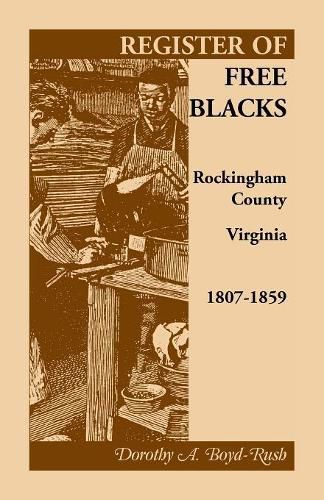Readings Newsletter
Become a Readings Member to make your shopping experience even easier.
Sign in or sign up for free!
You’re not far away from qualifying for FREE standard shipping within Australia
You’ve qualified for FREE standard shipping within Australia
The cart is loading…






This title is printed to order. This book may have been self-published. If so, we cannot guarantee the quality of the content. In the main most books will have gone through the editing process however some may not. We therefore suggest that you be aware of this before ordering this book. If in doubt check either the author or publisher’s details as we are unable to accept any returns unless they are faulty. Please contact us if you have any questions.
The Register of Free Blacks kept by the clerks of Rockingham County from 1807 to 1859 is one of the most conscientiously-kept records of the Commonwealth. Here, the register has been transcribed, providing researchers with a valuable data source. A typical entry contains the subject’s name, date of registration, physical description and details of emancipation. While all free blacks were officially required to register every year in the cities and every three years in the counties, compliance with the law was generally lax, suggesting that all those within at least the more rural communities of Virginia were not only known to each other but coexisted with relative harmony. Consequently, many free blacks never bothered to re-register or even to register at all. Therefore, warns the author, a Professor of History at James Madison University, the presence or absence of an individual’s name_is not conclusive proof of anything. Of the free blacks who did register in Rockingham County, most claimed freedom by birth from free black or white mothers (the status of a child was determined by the mother’s status at the time of the child’s birth). Of the rest, the majority were slaves emancipated by the last will and testament of their owners. A minority but nevertheless significant number of registered blacks secured their freedom by buying deeds of emancipation from their owners, sometimes for a nominal sum of money but other times up to his or her current market value as a slave. Since many of the wills of Rockingham County were destroyed in the Civil War, the references in the register are often the only clue to their existence, making this book a valuable tool even for those without black ancestors. A list of the wills that did survive is contained in the appendix. The everyname index will be a great aid to researchers.
$9.00 standard shipping within Australia
FREE standard shipping within Australia for orders over $100.00
Express & International shipping calculated at checkout
This title is printed to order. This book may have been self-published. If so, we cannot guarantee the quality of the content. In the main most books will have gone through the editing process however some may not. We therefore suggest that you be aware of this before ordering this book. If in doubt check either the author or publisher’s details as we are unable to accept any returns unless they are faulty. Please contact us if you have any questions.
The Register of Free Blacks kept by the clerks of Rockingham County from 1807 to 1859 is one of the most conscientiously-kept records of the Commonwealth. Here, the register has been transcribed, providing researchers with a valuable data source. A typical entry contains the subject’s name, date of registration, physical description and details of emancipation. While all free blacks were officially required to register every year in the cities and every three years in the counties, compliance with the law was generally lax, suggesting that all those within at least the more rural communities of Virginia were not only known to each other but coexisted with relative harmony. Consequently, many free blacks never bothered to re-register or even to register at all. Therefore, warns the author, a Professor of History at James Madison University, the presence or absence of an individual’s name_is not conclusive proof of anything. Of the free blacks who did register in Rockingham County, most claimed freedom by birth from free black or white mothers (the status of a child was determined by the mother’s status at the time of the child’s birth). Of the rest, the majority were slaves emancipated by the last will and testament of their owners. A minority but nevertheless significant number of registered blacks secured their freedom by buying deeds of emancipation from their owners, sometimes for a nominal sum of money but other times up to his or her current market value as a slave. Since many of the wills of Rockingham County were destroyed in the Civil War, the references in the register are often the only clue to their existence, making this book a valuable tool even for those without black ancestors. A list of the wills that did survive is contained in the appendix. The everyname index will be a great aid to researchers.